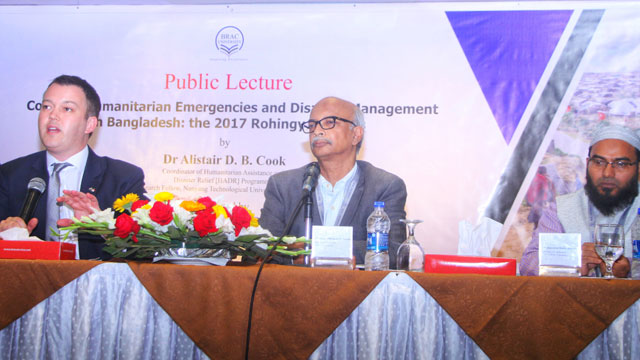Local and foreign researchers on Sunday stressed the need for setting a timeline for the repatriation of Rohingya people to Myanmar as the crisis raised concern over ethnic balance and political stability in the region.
‘As a diverse non-Muslim region, Chittagong Hill Tracts is home to Bangladesh’s ethnic minorities, the mass movement of the Rohingya refugees into the area caused concern over ethnic balance and political stability,’ Alistair DB Cook, a research fellow of Nanyang Technological University, Singapore said at a public lecture organised by Centre for Peace and Justice of BRAC University in Dhaka.
However, with timeline yet to be set for the repatriation of Rohingya to Myanmar, many humanitarian agencies are unable to commit resources for sustainable interventions beyond the end of 2018 and unable to formulate an exit strategy, he said.
Cook quoted, in his paper, a Dhaka-based INGO representative as saying, ‘If you don’t have a good, long-term vision or strategy in place, it is difficult to plan. Each and every day the situation is changing. Sometimes, we hear that the repatriation will start and then we may have to plan for a quick pull out. Then, you see, it may not happen.’
In a multi-agency environment, there are broad variations in the conduct of disaster management activities on the ground.
This begin from the collection of data, to needs assessments, the distribution of relief items, and monitoring and evaluation, said Cook, adding that the significant challenges to inter-NGO coordination are how to harmonize these differences to ensure consistency in coordination at the ground level, and balancing competing and legitimate priorities across different sectors.
He observed that in Bangladesh there is a tendency to politicise humanitarian assistance and disaster relief and things are also made difficult by competition among stakeholders.
There are constraints in activities operations, coordination, accountability and localisation, he said.
BRAC University pro-vice chancellor Proffessor Mohammad Tamim and research coordinator of Centre for Peace and Justice Muhammad Badiuzzaman also spoke on the occasion.
More than 7,00,000 Rohingyas, mostly women, children and aged people, entered Bangladesh after fleeing unbridled murder, arson and rape during ‘security operations’ by Myanmar military in Rakhine, what the United Nations denounced as ethnic cleansing and genocide, beginning from August 25, 2017.
The ongoing Rohingya influx took the number of undocumented Myanmar nationals and registered refugees in Bangladesh to about 11,16,000, according to estimates by UN agencies and Bangladesh foreign ministry.





